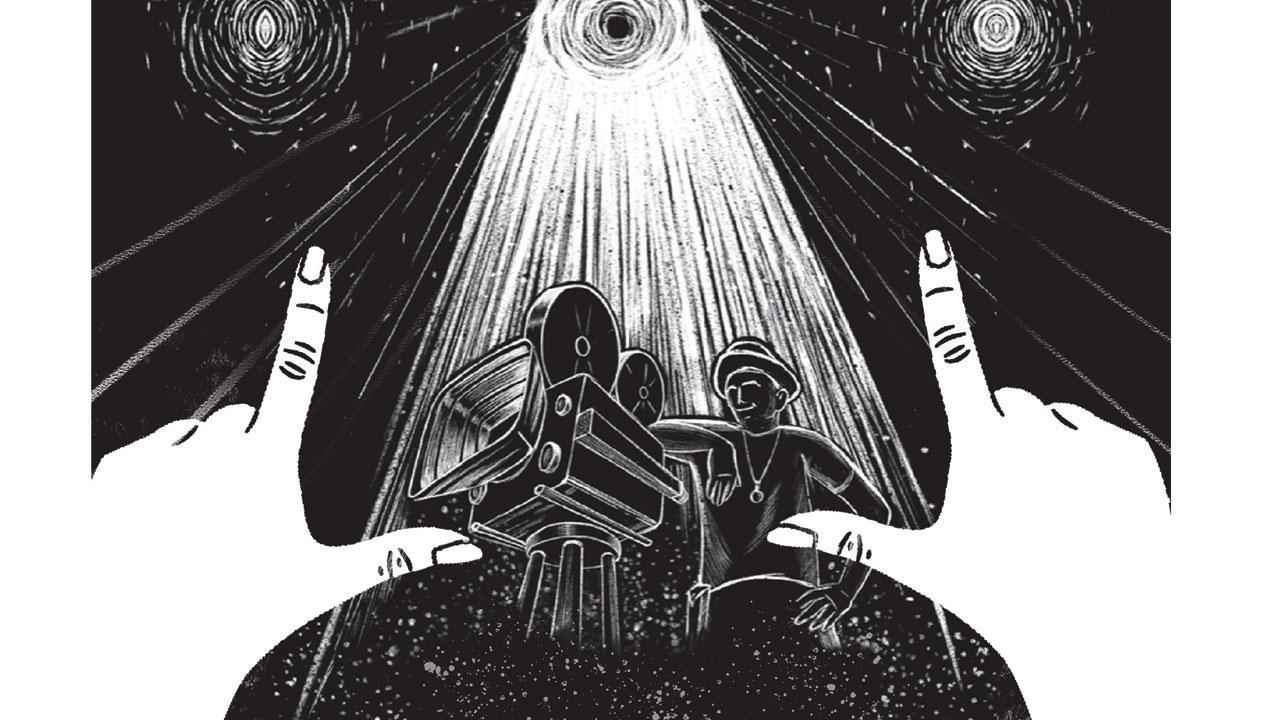Hemant Chaturvedi is the outstanding cinematographer of many Hindi films, including the extraordinary Maqbool; Company, Makdee, Ishaqzaade and 15 Park Avenue (English)

Illustration/Uday Mohite
![]() Hey, all of you, who have ever loved the movies, can you name a single cinematographer who has shot any of the films you have loved? For two hours or more we are mesmerised by images of films, that we remember for decades. Yet, very few care to find out who created those images and worlds; most people know only the names of film stars; occasionally the director or music composer. Cinematographers, editors and other crew are Dalits in the hierarchy of our love for the movies. Chhayaankan: The Management of Shadows, a documentary by Hemant Chaturvedi, is a warm tribute to Hindi cinema’s cinematographers. Chhayaankan, which has had limited, mainly private or online screenings so far, will be screened for the public at Museo Camera Centre For The Photographic Arts, Gurgaon, on June 25 and 26 (@museocamera.org).
Hey, all of you, who have ever loved the movies, can you name a single cinematographer who has shot any of the films you have loved? For two hours or more we are mesmerised by images of films, that we remember for decades. Yet, very few care to find out who created those images and worlds; most people know only the names of film stars; occasionally the director or music composer. Cinematographers, editors and other crew are Dalits in the hierarchy of our love for the movies. Chhayaankan: The Management of Shadows, a documentary by Hemant Chaturvedi, is a warm tribute to Hindi cinema’s cinematographers. Chhayaankan, which has had limited, mainly private or online screenings so far, will be screened for the public at Museo Camera Centre For The Photographic Arts, Gurgaon, on June 25 and 26 (@museocamera.org).
ADVERTISEMENT
Hemant Chaturvedi is the outstanding cinematographer of many Hindi films, including the extraordinary Maqbool; Company, Makdee, Ishaqzaade and 15 Park Avenue (English). Disillusioned, he quit the mainstream film industry in 2015 to focus on independent projects— Chhayaankan, and still photography projects, including on India’s single screen cinemas. Chhayaankan explores the lives and work of 14 senior cinematographers, who have significantly contributed to the Mumbai film industry since the 1950s. These include Govind Nihalani (Aakrosh), Jehangir Chowdhury (Mirch Masala), Peter Pereira (Amar Akbar Anthony), SM Anwar (Sholay’s operative cameraman under Dwarka Divecha), Nadeem Khan (Gaman, Disco Dancer), AK Bir (27 Down), Pravin Bhatt (Umrao Jaan), Baba Azmi (Mr India), RM Rao (Taj Mahal: An Eternal Love Story), and more. Waheeda Rehman is the only non-cinematographer interviewed.
The film is a revelation and delight, peppered with anecdotes as cinematographers reflect on their work ethics, how they got their way with the directors and stars, the jugaad they’d invent—and also the use-and-throw culture of the film industry, that has left many stalwarts lonely and frustrated. Nadeem Khan, who shot Muzaffar Ali’s Gaman, reveals that originally Jean Renoir was supposed to shoot the film, but when he dropped out, Khan stepped in. “It changed my life,” he says. Yet, soon after, Khan found himself shooting Disco Dancer with Mithun Chakraborty.
SM Anwar, who worked on Sholay, describes using moringa trees, with lighter wood, for a shot where a running train knocks a bunch of wooden logs. And doing “30 retakes” with Dharmendra and Hema Malini, “kyunki Dharamji ko pyar ho gaya, na?” Govind Nihalani speaks of his guru VK Murthy teaching him that “your image can create an emotional response”. Jehangir Chowdhury describes how Hungarian-American cinematographer Vilmos Zsigmond created magic with just a white bedsheet, underlining that in cinematography, the thought process is more important than the equipment. Waheeda Rahman recalls how once, while shooting Pyaasa, Guru Dutt asked her why she was so stiff, and she replied, “Because (VK) Murthy Saab is using a 75mm lens.” And he said, “Oho, you’re learning so fast. CID khatam nahin hui and you’ve understood 75mm lenses?”
The irony is that, despite Chaturvedi’s cinematographic talents, the documentary is primarily a talking heads film; presumably made with urgency as the cinematographers were ageing and dying. Editor Suchitra Sathe does a decent job. There are no women cinematographers in the film; not even, sadly, film clips to illustrate points. Nonetheless, it is a precious document on the artists who shape the films we love, with an insightful commentary into what makes Bollywood tick—its stars, generosity, rage, and its disposable culture. Not to be missed.
Meenakshi Shedde is India and South Asia Delegate to the Berlin International Film Festival, National Award-winning critic, curator to festivals worldwide and journalist.
Reach her at meenakshi.shedde@mid-day.com
 Subscribe today by clicking the link and stay updated with the latest news!" Click here!
Subscribe today by clicking the link and stay updated with the latest news!" Click here!







